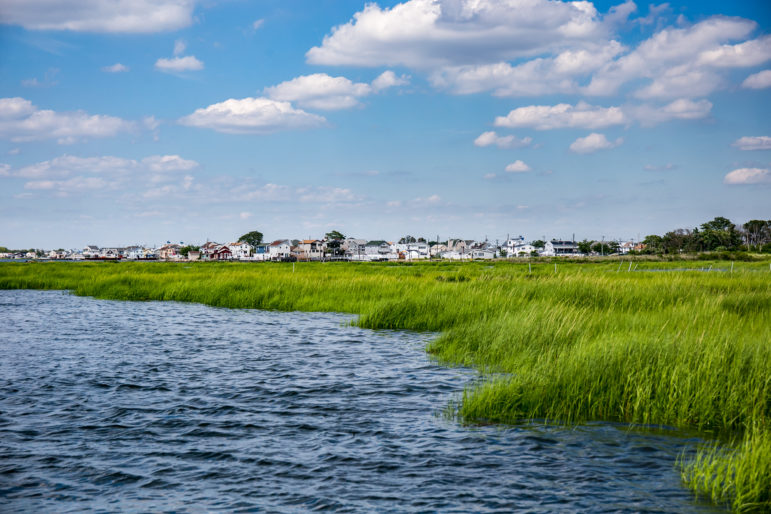As the primary race wraps up, endorsements from environmental groups abound. Who made the cut?

Adi Talwar
Jamaica Bay, one of the city’s many coastal areas threatened by climate change.Early voting for the New York City mayoral primaries is underway with 13 Democratic candidates vying to replace Bill de Blasio at Gracie Mansion next January.
How the candidates will address climate change and extreme weather in the city rarely came up during multiple televised debates so far, leaving more air time for the contenders to spar over Eric Adams’ residency in New York and Andrew Yang’s proposal of bringing so-called TikTok hype houses to the city.
But several environmental advocacy groups and environmentally-minded politicians have interviewed the top Democratic candidates about their green-minded motives, including clean energy, open streets and climate justice. (There are also two Republican candidates competing against one another in the June primary: Curtis Sliwa and Fernando Mateo, neither of whom explicitly included climate change or environmental policies among the “issues” outlined on their campaign sites.)
Here is where the major Democratic contenders stand:
Kathryn Garcia has received the largest number of heavy-hitting endorsements from green groups, including coveted support from the New York League of Conservation Voters, which lauded her performance reducing waste as sanitation commissioner and her plan to protect the city’s coastlines from storms. Garcia was named a “committed champion of the environment” in an endorsement by the New York Daily News. The New York Times’ editorial board, which also endorsed Garcia, noted her success restoring the city’s wastewater treatment plants after Superstorm Sandy during her tenure at the Department of Environmental Protection.
Last week, her commitment to creating 250 miles of protected bike lanes in the city and supporting working cyclists earned her an endorsement from StreetsPAC, which promotes safe, open streets and efficient public transit.
The political action committee noted that although Garcia earned its endorsement, all seven Democratic candidates who completed its questionnaire (missing: Ray McGuire) supported a reduced reliance on cars in the city, a better transit system and protected bike lanes — a trend toward environmentalism that was a notable “sea change” from the past election cycles, StreetsPAC says.
Garcia tied for second choice with former Obama Cabinet member Shaun Donovan for an endorsement by the Resilience Political Action Committee, which focuses on mitigating climate change in New York City. The PAC named Maya Wiley as its first choice. Late last year, Donovan released a hyper-detailed 6,000-word climate plan that addressed environmental justice and earned praise from Eddie Bautista of the New York City Environmental Justice Alliance. He has yet to earn a first-place endorsement from the most coveted environmental groups, but he has been endorsed by 314 Action Plan, which supports science- and evidence-based policy.
Maya Wiley, a civil rights lawyer, shot up to the second spot in the latest PIX11/NewsNation/Emerson College, following an 11th-hour endorsement from Representative Alexandria Ocasio-Cortez, champion of the Green New Deal. Delivered on June 5 from the steps of City Hall, Ocasio-Cortez cited Wiley’s focus on “racial justice, economic justice, and climate justice.”
Wiley’s “Community First Climate Action Plan” emphasizes investments in making NYCHA housing more resilient, “greening” Rikers Island, and addressing high asthma rates in communities of color.
City Comptroller Scott Stringer, who said in multiple interviews that he aspires to put a solar panel on every roof and an electric battery in every basement, has advocated against fracking and pipeline projects in the city and has divested $4 billion of the city’s pensions funds away from fossil fuel companies.
Stringer originally received endorsements from Food and Water Action and a co-endorsement with Dianne Morales from Sunrise Movement NYC. Both were rescinded, however, following an allegation in April of sexual misconduct from 2001 by Jean Kim, a former unpaid campaign staffer. (On June 4, The New York Times reported a second allegation by Teresa Logan, who worked at an Upper West Side bar co-founded by Stringer in the early ’90s. Stringer has denied both allegations.)
Dianne Morales has likewise faced turmoil in the final month of her campaign amid reports of mistreatment and firing of staffers who moved to unionize. Still, the nonprofit exec holds endorsements from grassroots groups Rockaway Revolution and the NYC chapter of the Sunrise Movement, a national youth climate-activist movement. Her plan — Green Jobs, Green Food, Green Justice — calls for the creation of an “urban climate corps” to expand and protect green spaces, and an “Office of Urban Agriculture” to support urban farmers. Last November, she signed a pledge to champion the Green New Deal and refuse contributions greater than $200 from individuals or companies associated with oil, gas and coal companies.
A new poll Monday showed a lead by Eric Adams, Brooklyn borough president and former New York Police Department captain. Adams has been vocal about his plan to make New York City a hub for wind power manufacturing. He is also a devout vegan who promotes plant-based diet options in government buildings, schools and prisons. “People don’t realize that meat and our overconsumption of meat is destroying our Amazon,” he said in an interview with the New York League of Conservation Voters.
Entrepreneur and former presidential hopeful Andrew Yang has promoted shifting to clean energy (he suggested putting solar panels over city landfills) and investing in urban agriculture, especially in low-income communities. He also cites plans to expand the NYC Cool Roofs program, which involves painting rooftop whites as a way to mitigate the heat island effect. Yang, who was previously leading the race by a wide margin but has since fallen into the third spot, was previously criticized for claiming “we are too late” in addressing climate change during a presidential debate.
Ray McGuire has fewer details about his climate plan on his website than the other candidates (it is tucked into a “Quality of Life” section that also addresses COVID and the arts). The Wall Street executive calls for an increase in the Parks Department’s budget and for a resiliency plan for the city’s waterfront. He was one of five candidates to participate in a roundtable by the New York League of Conservation Voters, where he emphasized the importance of composting, waste collection and retrofitting buildings.
This election marks the first citywide contest that will use a ranked-choice ballot, allowing voters to select up to five candidates in order of preference. Early voting began Saturday and continues until June 20. The primary election will be held on June 22, and the general mayoral election will be on Nov. 2.
Liz Donovan is a Report for America corps member.









